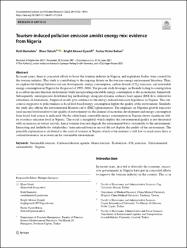| dc.contributor.author | Bamidele, Ruth Oluyemi | |
| dc.contributor.author | Öztürk, İlhan | |
| dc.contributor.author | Gyamfi, Bright Akwasi | |
| dc.contributor.author | Bekun, Festus Victor | |
| dc.date.accessioned | 2023-08-11T17:21:34Z | |
| dc.date.available | 2023-08-11T17:21:34Z | |
| dc.date.issued | 2022 | en_US |
| dc.identifier.issn | 0944-1344 | |
| dc.identifier.issn | 1614-7499 | |
| dc.identifier.uri | https://hdl.handle.net/11363/5259 | |
| dc.description.abstract | In recent years, there is concerted eforts to boost the tourism industry in Nigeria, and regulatory bodies were created for
the tourism industry. This study is contributing to the ongoing debate on the tourism-energy-environment literature. Thus,
we explore the linkage between tourism development, energy consumption, carbon dioxide (CO2) emission, and renewable
energy consumption in Nigeria for the period of 1995–2016. The present study leverages on Bounds testing to cointegration
in a carbon-income function environment while incorporating renewable energy consumption to the econometric framework.
Subsequently, autoregressive distributed lag methodology alongside dynamic ordinary least square (DOLS) is utilized for
robustness of estimations. Empirical results give credence to the energy-induced emission hypothesis in Nigeria. This outcome is suggestive to policymakers as fossil fuel-based energy consumption deplete the quality of the environment. Similarly,
the study also afrms the environmental Kuznets curve (EKC) phenomenon. The emphasis on Nigerian growth trajectory
(real income level) relative to her quality of environment via the channel of economic development and energy consumption
from fossil-fuel source is indicated. On the other hand, renewable energy consumption in Nigeria shows signifcant ability to reduce emission level in Nigeria. This result is insightful, which implies that environmental quality is not threatened
with an increase in tourist arrivals, hence tourism does not degrade the environment but is sustainable to the environment.
Interesting and laudable for stakeholders’ international tourism arrival did not deplete the quality of the environment. The
plausible explanation is attributed to the scale of tourism in Nigeria which at the moment is still low or much more there is
caution/awareness on ecotourism for sustainable environment. | en_US |
| dc.language.iso | eng | en_US |
| dc.publisher | SPRINGER HEIDELBERG, TIERGARTENSTRASSE 17, D-69121 HEIDELBERG, GERMANY | en_US |
| dc.relation.isversionof | 10.1007/s11356-021-17233-8 | en_US |
| dc.rights | info:eu-repo/semantics/openAccess | en_US |
| dc.rights | Attribution-NonCommercial-NoDerivs 3.0 United States | * |
| dc.rights.uri | http://creativecommons.org/licenses/by-nc-nd/3.0/us/ | * |
| dc.subject | Sustainable tourism | en_US |
| dc.subject | Carbon-reduction agenda | en_US |
| dc.subject | Green tourism | en_US |
| dc.subject | Ecotourism | en_US |
| dc.subject | CO2 emission | en_US |
| dc.subject | Environmental sustainability | en_US |
| dc.subject | Nigeria | en_US |
| dc.title | Tourism-induced pollution emission amidst energy mix: evidence from Nigeria | en_US |
| dc.type | article | en_US |
| dc.relation.ispartof | Environmental Science and Pollution Research | en_US |
| dc.department | İktisadi İdari ve Sosyal Bilimler Fakültesi | en_US |
| dc.identifier.volume | 29 | en_US |
| dc.identifier.issue | 13 | en_US |
| dc.identifier.startpage | 19752 | en_US |
| dc.identifier.endpage | 19761 | en_US |
| dc.relation.publicationcategory | Makale - Uluslararası Hakemli Dergi - Kurum Öğretim Elemanı | en_US |
| dc.contributor.institutionauthor | Bekun, Festus Victor | |



















